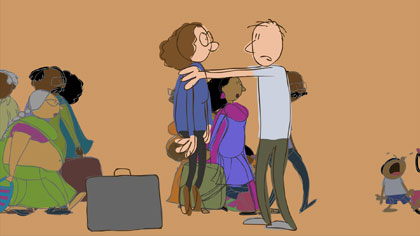Truly oh Gilgamish he is 18born2 in the fields like thee. 19The mountains have reared him. 20Thou beholdest him and art distracted(?) 21Heroes kiss his feet. 22Thou shalt spare him…. 23Thou shalt lead him to me.” 24Again he dreamed and saw another dream 25and reported it unto his mother. 26“My mother, I have seen another 27[dream. I beheld] my likeness in the street. 28In Erech of the wide spaces3 29he hurled the axe, 30and they assembled about him. 31Another axe seemed his visage.
In this passage, Gilgamesh dreams of a figure who will be his equal, and interpreters tell him that “heroes kiss his feet” and that he will lead Gilgamesh. This prophetic dream frames Enkidu as Gilgamesh’s destined counterpart: not only a rival but also a partner who will shape his heroic identity. The imagery of “an axe in the street” and “heroes kiss his feet” reflects how masculinity is tied to symbols of power and violence, yet also reverence. The text suggests that Gilgamesh’s greatness requires balance. Gender politics emerge through the absence of women in this dream: the hero’s destiny is mediated entirely through male bonds. The translation describe Enkidu as Gilgamesh’s “likeness,” collapsing rivalry into mirror-image intimacy. Gilgamesh’s heroic identity is forged in masculine struggle and mutual recognition.
 To me the real hero of the story is not Gilgamesh but Inkidu. Gilgamesh full of human vices despite being a demigod. But Inkidu was the reason why Gilgamesh started to live. Gilgamesh would have being nothing without his partner, he would not have suffer in like without Inkidu's death, and would have not turn his life around either. This is why Inkidu is the hero.
CC BY-NC-ND
To me the real hero of the story is not Gilgamesh but Inkidu. Gilgamesh full of human vices despite being a demigod. But Inkidu was the reason why Gilgamesh started to live. Gilgamesh would have being nothing without his partner, he would not have suffer in like without Inkidu's death, and would have not turn his life around either. This is why Inkidu is the hero.
CC BY-NC-ND  At the end of the day, the only hero in the story was Nina herself. Rama was a complete self absorbed jerk and Sita was completely submissive and did not think of her even once. While Nina went through modern similar faces of rejection and self worth, she came to terms with herself, and accepted the fact that her ex boyfriend was not worth her pain and that she had to move on in life.
CC BY-NC-ND
At the end of the day, the only hero in the story was Nina herself. Rama was a complete self absorbed jerk and Sita was completely submissive and did not think of her even once. While Nina went through modern similar faces of rejection and self worth, she came to terms with herself, and accepted the fact that her ex boyfriend was not worth her pain and that she had to move on in life.
CC BY-NC-ND